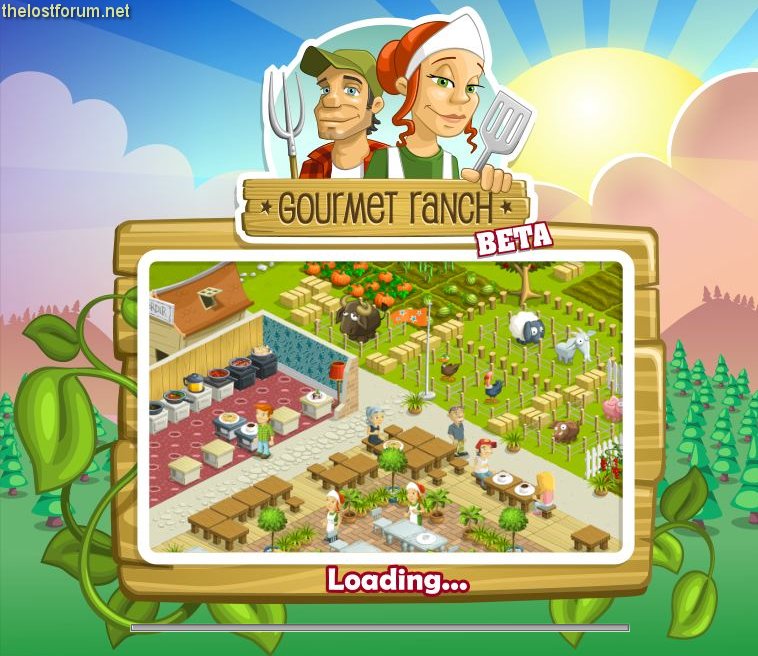游戏推介:Playdemic推出facebook美食牧场新游戏
Playdemic在Facebook上发布了名为“美食牧场”的游戏,顾名思义,该游戏是一个结合了农场和餐厅的模拟游戏。
像Playdemic尝试地将它农场体裁的游戏与Zynga旗下的“咖啡世界”结合一样,“美食牧场”每月拥有超过14.3万的活跃用户并且数量还在呈不断增长的趋势,取得了很好的成绩。虽然该游戏听起来很有技术含量并且制作得很精细,但它并没给玩家有带来特别新的玩法。即便如此,它在便利和社会因素的方面确实做得不错。
游戏最基本的目标是建立一家成功的绿色食物餐厅。为此,玩家需要创设店内/店外空间来服务顾客。餐厅将用特色的食材做好的美食(煮的时间越久,价值越高)放置在餐柜里,柜子旁边站有女服务员为顾客服务。餐厅里每道菜都有一定的份数,并且只有一道菜可以在每个火炉上烹饪和摆在每个餐柜里。
当游戏进度进行到过半时,还有一个业务受欢迎程度比例的评定。当顾客来餐厅用餐时,他们会给出不同的赞美来提高这一比例,赞美比例越高,就会有越多的顾客来付钱购买餐厅的食物。不幸的是,影响受欢迎的因素是捉摸不定的。例如,我们没有看到任何顾客生气不满,但受欢迎比例却在下降(看上去像是被动的衰退)。而有时它又超过130,这些变化是否过大尚无定论。
烹饪食物只是游戏的一半,另一半是种植/养殖作为大量潜在菜肴的每一种原料的农业领域。像在FarmVille里一样,农业领域由玉米、树和动物组成,时间花得越长,原料品质越好。与典型的耕地、收获、冲洗和重复的步骤唯一的不同点是玩家不必在收获后重新耕地和动物必须养在围栏里。
美食农场有一个非常好的地方是玩家在游戏中不必扮演两个角色。游戏采用一个便捷的方法来处理它们,那就是如果玩家对餐厅的职业这个角色感兴趣,那么他们可以总是从一个随机的非玩家角色(电脑自己设定的角色)那购买餐厅的原料(虽然会有点贵)。同样,如果玩家只是对农场感兴趣,那他们可以将他们的作物用来做交易。
然而,农场比较难赚钱,尽管它是支撑这个游戏的主要社会因素。在每次收获或者一道菜的完成后,玩家都可以选择留下或者出售他们的产品。从那儿,玩家的朋友可以以较低的价格购买这些产品。显然的,如果一个玩家没有很多的游戏同伴,这就不是一个可靠的收入来源,但它终究是一项好的新增产品。
至于其他的社会因素,对农场来说都是十分基本的。包括访问彼此的农场和给作物施肥。不过,新增的一个可以在墙上张贴的小符号可以让玩家加入特定的美食牧场的表情以显示玩家闷热、快乐和嘲讽的情感。除此之外,如果你的朋友在你的贴画上点击,他将得到微薄的奖励,比如可以得到更大份的食物。
美食牧场的缺点是它主要是将两个游戏捆绑在一起而并没有做太多的创新。除了较完善的社会功能和一些很方便的方面外,几乎没有什么值得详述。而且,结合流行游戏场所这一做法已经太过老套。Café World 和 FarmVille已经结合的方法已经为 Wonder Island from Gamenaughts所利用。虽然它使用的是不同的游戏,FrontierVille仍然是一个经过混合匹配的游戏(如Treasure Isle)
不幸的是,这样的抱怨并不容易解决。一些物品(虽然较小)在美食农场这个游戏中的价格非常昂贵。植物、花卉和石头还可以付得起,但是一些物品的价格实在是荒谬之极。在游戏中,玩家仅能从每个顾客身上赚取少量的费用,但一个简单的手推车的轮子却要花费15万美元,一个欢迎的标志要花9.6万。
总的来说,美食农场听起来是很有技术含量并且运行良好的游戏。至少在一段时间内,它将表现良好并吸引更多的新玩家。但尽管如此,它仍是有两个经常看到的概念组合成的混合游戏。因此它的存在寿命和潜力将会多少受到限制。FarmVille玩家的持续下降足以证明人们正对农场这一主题逐渐厌烦,因此具有挑战性的开发商,无论新旧,都将乐于为社交游戏引进新观念。
(全文译者:唐统权)
As the name suggests, Playdemic‘s growing Facebook title, Gourmet Ranch, is a combination farming and restaurant simulation game.
With over 143,000 monthly active users and climbing, it’s doing well as it attempts to hybridize concepts from the farming genre and a Zynga title, Café World. While the game is technically sound and well made, it doesn’t bring anything particularly new to the game play directly. However, it does score bonus points in the forms of convenience and social elements.
The basic idea is to create a successful organic food restaurant. To that end, players create an indoor/outdoor space in which to serve customers. Using specific ingredients, dishes are cooked up (with more valuable ones taking longer) and placed on a counter, where a waitress comes to serves it to the paying patrons. Each dish has a set number of servings, and only one dish can be cooked per stove and served per counter-top.
As far as the restaurant half of the game goes, there is also a popularity rating for the business. As customers come and eat, they give varying amounts of praise that increase this number, and the larger it gets, the more patrons there are to fork out money. Unfortunately, the popularity element seems almost arbitrary, as we’ve yet to see anyone get upset and lower that rating (it does seem to decay passively), nor has it exceeded 130. Whether or not this changes at higher levels is yet to be determined.
Cooking up food is only half the game. The other half comes from the farming realm as each ingredient needed for the large quantity of potential dishes can be grown. Like in FarmVille, this consists of crops, trees, and animals, with the better ones taking longer to grow. It’s the typical plow, harvest, rinse and repeat concept with the only differences being that one doesn’t have to replow after a harvest and animals must be placed in pens.
One of the nice things about Gourmet Ranch is that one never has to take part in both aspects. There are convenient ways to work around both of them. If someone is only interested in the restaurant stuff, they can always purchase ingredients from a random non-player character (though this is a bit pricey). If they just want to farm, they can put their crops up for trade.
Farming, however, is a bit more difficult to make an income off of, as it’s where the major social features of this app comes into play. After each harvest or finished dish, players can choose to either keep it for themselves or put it in their Trade Store. From here, friends that play can purchase the item at a cheap price. Obviously, this means that if one doesn’t have many friends that play, it’s not a reliable revenue source, but it’s a nice addition all the same.
Regarding other social elements, they are all fairly basic to the farming niche, consisting of visiting each others’ farms and fertilizing crops. However, there is a minor addition to wall posting that allows them to include a specific Gourmet Ranch emoticon representing a sultry, happy, or sneering look. Additionally, if friends do click on a post, the player gets little bonuses to things like the serving size of a dish.
On the negative side, Gourmet Ranch is mostly two games stuck together with minimal innovation. Other than improved social features and some greater convenience, there’s not a whole lot to write home about. Moreover, the combination of popular game premises is something that’s been occurring in increasing frequency. Already, this exact combination of Café World and FarmVille mechanics was done with Wonder Island from Gamenaughts. Though it uses different games, FrontierVille is yet another app to mix and match features (such as FarmVille and Treasure Isle).
Unfortunately, such a complaint is no easy fix. One that is (though minor by comparison), is the extraordinarily high price of decorative items in Gourmet Ranch. Plants, flowers, and rocks are affordable enough, but some things are just absurd. In the game, players earn small amounts of money per paying customer, yet a simple Wagon Wheel costs $150,000 while a Welcome Sign costs $96,000.
In the end, Gourmet Ranch is a technically sound good that plays well. At least for a time, it will do well and attract some new players too. Nevertheless, it is still made up of two concepts that have been seen time and time again, thus the longevity of the title and its potential will likely be a bit stunted. FarmVille’s continual decline is proof enough that people are getting bored with the farming concept, thus challenging developers, new and old, to be more innovative with social games.(source:inside social games)








































 闽公网安备35020302001549号
闽公网安备35020302001549号